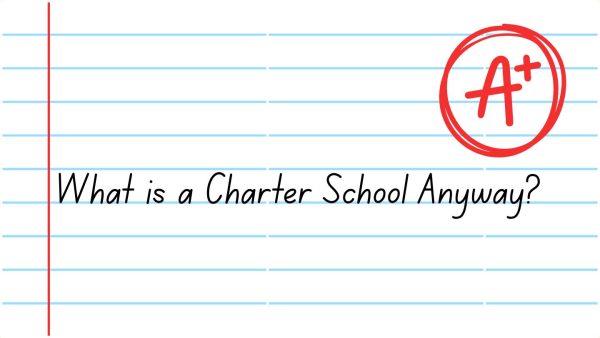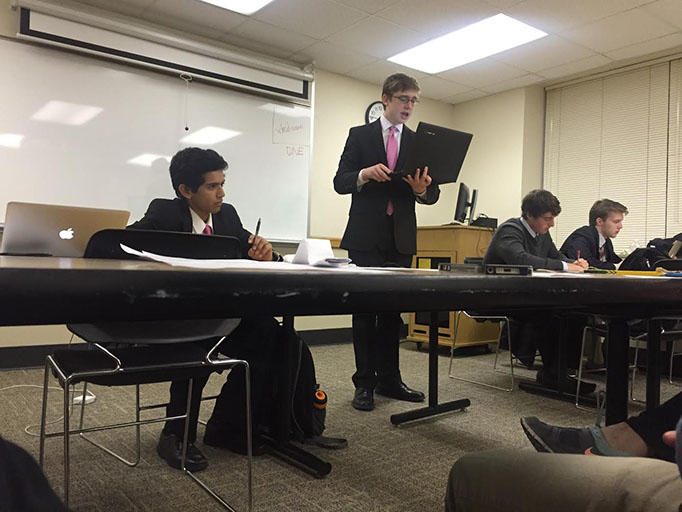Debate team qualifies for nationals
Prakhyath Bujimalla and Jack Lucas ’18 debate in the semifinals t the Iowa State tournament.
After nine students qualified for the National Debate Tournament in Birmingham, AL, in June, four of them travelled to Kentucky in April for a tune-up.
Prakhyath Bujimalla, Jack Lucas, Peter Beebe and Kate Snyder participated in the Tournament of Champions (TOC) in Kentucky. This is the most prestigious national championship tournament in the country and is a process to be accepted.
In order quality for TOC, they have to receive two bids from various tournaments around the country to prove that they did not fluke once. Generally, TOC consists of the top 100 teams from around the country and this year, a few teams from China competed.
Prakhyath Bujimalla ’18, who attended the tournament, thought it was very beneficial. “There were a lot of interesting rounds because people debate differently across the country and so it was fun to learn about all of the different styles,” Bujimalla said. “It was also really cool to see people we haven’t seen in a few months who we know from tournaments or camps.”
Although not as favorable, Bujimalla was satisfied with the outcome of the tournament. “We placed in the top 70, which was alright for our first tournament against really tough competition,” Bujimalla said. “Overall, the rounds were really competitive which gave us a lot more confidence going into nationals because it showed us we can compete with anyone from anywhere.”
Most tournaments, including nationals, have five to six preliminary rounds, and, based upon the record of those rounds, teams are seeded. Tournaments then take the top eight or so teams and put them into a double elimination tournament.
The other five students who make up the national team include Tara Djukanovic, Nicole Hobson, Nika Silkin, Asiya Mohammad and Alexis Rivett. Although the students have qualified in a variety of different debate styles, the most common style is public forum which is a two-person debate. Public forum is split into two sections: crossfires and grand cross. Crossfires is first and allows one partner to speak at a time supporting their argument. Grand cross allows everyone to talk and each team asks the other questions to try and refute the competitions argument.
After the debate, the panel of judges decides who won. The three to seven judges each decide individually who they believe had a stronger argument and which ever team won over the most judges, wins the debate.
The public forum topic for nationals is whether or not the United States federal government should prioritize its counter terrorism efforts over its humanitarian assistance.
Debate coach Jeremy Fitzpatrick said they tweaked their approach. “We didn’t really change how we prepared this year besides looking at things more in depth and taking more time on things which I think is part of what helped us make it to nationals,” Fitzpatrick said. “Another thing that helped several of the qualifiers was that they went to a debate camp over the summer.”
Bujmalla was one 0f many that attended the camp in North Carolina. “The camp was really rigorous and there was a lot of instruction from a lot of top coaches from around the country,” Bujimalla said. “This gave us all a whole new perspective on debate and showed us what evidence to look at and how to research.”
A typical day would start with camp-wide lectures about the topics they would debate over the year. They then broke into groups where they got individual instruction on their specific styles of debating. Following that was a lecture about skills they would learn and it was also a time for the students to ask any questions they had. At the end of the day, they had practice rounds which helped prepare them for the tournament at the end of the two-week camp.
Along with the camp, they also competed in several more out-of-state tournaments than in previous years. Fitzpatrick thought this helped. “Getting some more experience against the national competition definitely helped us because when you debate the same people over and over again it gets a little stale and you aren’t pushed as much,'” Fitzpatrick said.
Fitzpatrick is happy with the teams he has had over the years. “I’ve been very fortunate and in all three years that I’ve been here I have had students qualify for nationals, but what makes this year unique is that this is he most students I’ve had qualify,”Fitzpatrick said. “To me, this signifies the students hard work and dedication towards this and it showcases what we’ve been working so hard for.”






